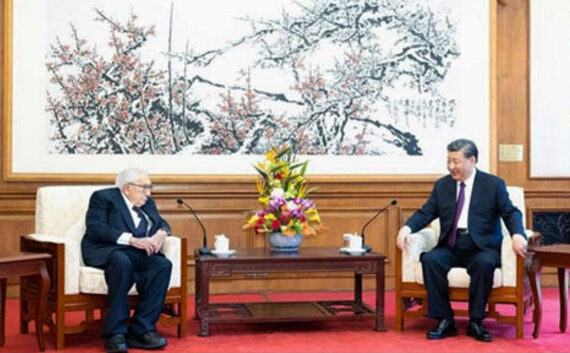FPI / December 6, 2023
By Richard Fisher
At age 100 on Nov. 29, former United States Secretary of State Dr. Henry Kissinger passed away.

While the nation has for decades and will continue to mark his accomplishments and controversy, it is also time to mark the passing of his dysfunctional and self-defeating policies and approaches toward China under the dictatorship of the Chinese Communist Party (CCP).
The CCP, in contrast, has mourned Kissinger’s death at a level approaching that of a CCP Politburo member. Consider that in 2023, state media flagship Global Times has written about Kissinger over 60 times, with many articles urging Americans to continue the template he established for prioritizing U.S.-China relations.
Despite his great influence on U.S. relations with China, his many articles, op-eds and books, it is less known that Kissinger was not trained as a China scholar.
Remarkably, while it is known that he visited China over 100 times in his lifetime, it is far less known that he never visited Taiwan even once.
Kissinger studied, wrote his Harvard Ph.D. dissertation on, and likely styled himself as a modern incarnation of Prince Klemens von Metternich, an Austrian statesman-diplomat who was instrumental in the 1815 Congress of Vienna, that created the basis for a post-Napoleon balance-of-power stability in Europe.
For Kissinger, real politic or realism, the recognition of power as the basis for political relations — much less idealism and morality — guided his advice and analysis to President Richard Nixon as National Security Advisor and as Secretary of State to President Gerald Ford.
This helped form crucial decisions that he would then then defend for the rest of his life, to include his acceptance, even embrace of the leadership of the Chinese Communist Party as a legitimate power and partner to shape global affairs.
It was Kissinger who in 1971 went to China to pave the way for Nixon’s visit, which was a kind of “kowtow” to Mao Zedong, giving him the first acknowledgement, when it was Mao who isolated China from the U.S. for nearly 20 years and was in a near alliance with the Soviet Union for a decade.
Kissinger’s acceptance became the CCP’s ticket to its entry into global power politics, with a focus on the interactions of the leadership of the CCP with other foreign leaders, further legitimizing the CCP.
Full Report . . . . Current Edition . . . . Subscription Information
Free Press International
